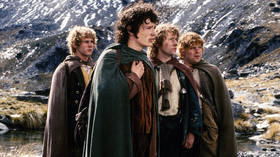Hollywood’s political obsessions ruin more than Oscar ratings. They’re killing good stories that explore our universal experiences
Many pundits pining over political and entertainment issues this week insist Sunday’s disastrous Oscar ratings are due to the expounding of progressive politics from Hollywood elites. But the problem is deeper than just the award.
Politics is an easy peg on which to hang an op-ed when fewer than 10 million Americans watched an event that used to be required viewing around the world.
In fact, such socio-political protestations look at the entertainment business’ declining influence from the wrong end. Clearly, the entertainment industry is dominated by progressive thought. That’s beyond reasonable debate. Still, it’s the audiences that are driving this issue because the tales Hollywood tells are so stilted by political addictions that they now rarely provide the sort of universal psychological satisfaction humans need from stories.
A single-minded, instinctive kneeling to a monolithic ideology is killing modern movies and television programs because humanity’s storytelling models have demands all their own. The tenets of any political philosophy will never fit narrative rules properly, and stories that ignore these essential elements never work.
At the constant risk of alienating half of my readership – a threat lurking around the turn of every expressed opinion these days – aspects of traditional liberal political thought offer necessary provocations and counterpoints. They examine entrenched illegality, prejudice and cruelty. In theory, liberal thought comforts the afflicted and afflicts the comfortable. This isn’t some veiled, unipolar assault on Hollywood’s little red book. The point is stories demand ingredients and structures that must supersede any political philosophy if they will succeed.
Consider the now well-trodden field of narrative myth on a global scale. Carl Jung’s mastery of shared consciousness and Joseph Campbell’s work on the power of myth demonstrate how our stories forge themselves out of shared life experience, not today’s news.
Also on rt.com Holding the Oscars in a train station makes sense – the show was a ghastly train wreckWe’ll use a simplified version of the classic storytelling model used from before the telling of Beowulf right up through Star Wars and beyond. We have a protagonist. That player could be a man, woman, child, team, animal, etc. The protagonist’s prerequisites are some measure of sympathetic appeal, some necessary skills or positive qualities and a sense of need. Our protagonist is incomplete and forever searching.
The protagonist sets out on a journey in search of the element that fulfills that need and furthers growth and fulfillment. That journey is an abandonment of comfort and safety, and it brings our main character into conflict with an antagonist, a force directly opposed to the main character’s needs. Often a monster in fairytales and ancient legends, this enemy seeks the same purpose or an outcome strongly at odds with that of the protagonist.
At first, the main character is not a match for the villain. There is an initial defeat – a challenge that forces the protagonist to suffer and strive while growing stronger and more capable. The protagonist encounters a guide figure along the way to share wisdom and abilities that offer assistance, but the guide must step aside when it comes time to face the monster again.
This time, armed with greater strength and heightened wisdom, the protagonist defeats the villain. Now free to return home better and stronger, the main character will soon find another adventure and a new journey waiting until age and experience turn the protagonist into a guide figure for some other traveler in another story.
Take that basic model and run the numbers for the most influential stories of the last 50 years: Lord of the Rings, Jaws, Star Wars, Rocky, Harry Potter, Batman, The Matrix, Aliens, Hunger Games, etc. The pieces click into place as easily as turning a page or settling into a seat with a bucket of popcorn.
Most importantly, you’ll notice there is no mention of politics in the model. Never. None. The model transcends our petty debates and polarized worldviews of the hour in favor of an exploration of the life all of us experience as we work to survive. Whether the coldest reactionary conservative or the hottest radical progressive, that person next to you has goals, obstacles, successes and failures. Life doesn’t care how you vote.
This simple model of storytelling did not emerge into our shared human consciousness because clever writers pieced together a psycho-political con job. It all works because such stories are sewn from the fabric of life itself. Our existences as human beings branded storytelling theory, never the other way around. We need. We search. We strive. We encounter obstacles and opposition. We lose. We win. We grow. We get up the next morning and do it again. Then, we tell the stories of how we did it.
Modern Hollywood now tosses out the storytelling models built over millennia for the political labors of the day. Its creators believe they can change humanity by manipulating their stories and imposing today’s philosophies. That creative model couldn’t be more backward in its intent, and the result is floods of unsatisfying tales that fail to connect psychologically with our shared reality.
Also on rt.com ‘The Father’ is a masterful film about living with dementia… and a reminder that America’s MSM is a dementia simulation machineWhile valuable in political circles, the motivations of coastal liberal political thought simply don’t work in essential storytelling models. For example, in an effort to show more nuanced compassion and to resist imposing moral structures, modern Hollywood often resists the notion of a villain. People are never bad, just misunderstood. It’s not Hannibal Lecter’s fault he wants to eat your face. That kind of wooly thinking sounds nice when uttered with a compassionate head tilt – but it leaves a massive hole in the heart of a good story.
Meanwhile, Tinseltown’s tendencies to protect those they see as marginalized people often gut a good protagonist. Reluctant to show weakness in a main character because it’s not politically correct simply makes for boring faces on the screen.
Rey from the most recent trio of Star Wars films is the unfortunate poster child for this overprotection. In an effort to offer a feminist hero, the stories create a woman who could do anything necessary right away. There’s minimal struggle, less self-discovery and very little development. She’s much the same woman at the end of six hours of movies as she was when audiences meet her. Since her evolution has nowhere to go, she never connects with audiences. As humans, we’re not good at everything – or anything – unless we work for it.
Consider Ripley from Aliens some 30 years ago. Haunted, frightened and reluctant to get involved, she battles through her journey, beats her monsters and emerges stronger, confident and at peace. The film’s creators had to be comfortable showing a woman in a weakened state first before revealing her heroic qualities by the story’s end. Such a film would likely not get made today.
You would think bleak ratings and declining box office receipts would convince studios and production companies to view their stories through an apolitical lens of shared humanity. Sadly, the religious and cultish nature of modern progressive thought seems to favor martyrdom over inspiration. It’s OK if you produce a bomb few people saw or enjoyed if you made the ignored failure for the right reasons.
Until storytellers return to seeing their audiences as human beings in a shared collective sense, many modern movies and TV shows will struggle to make a dent in our psyches – and Oscar night will continue to fade from our calendars.
Think your friends would be interested? Share this story!
The statements, views and opinions expressed in this column are solely those of the author and do not necessarily represent those of RT.















